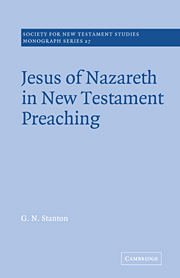Book contents
- Frontmatter
- Contents
- Preface
- Abbreviations
- Introduction
- 1 Jesus of Nazareth in missionary preaching: Luke's view
- 2 Luke's presentation of Jesus in his Gospel
- 3 Pre-Lucan traditions about Jesus in the speeches in Acts
- 4 Jesus in Paul's preaching
- 5 The gospels and ancient biographical writing
- 6 Jesus in the gospel traditions
- 7 The gospel traditions in the early church
- Conclusions
- Index of passages cited
- Index of authors
- General Index
1 - Jesus of Nazareth in missionary preaching: Luke's view
Published online by Cambridge University Press: 04 October 2009
- Frontmatter
- Contents
- Preface
- Abbreviations
- Introduction
- 1 Jesus of Nazareth in missionary preaching: Luke's view
- 2 Luke's presentation of Jesus in his Gospel
- 3 Pre-Lucan traditions about Jesus in the speeches in Acts
- 4 Jesus in Paul's preaching
- 5 The gospels and ancient biographical writing
- 6 Jesus in the gospel traditions
- 7 The gospel traditions in the early church
- Conclusions
- Index of passages cited
- Index of authors
- General Index
Summary
The Lucan writings are of particular importance for our attempt to show that some kind of an account of the life and character of Jesus formed an integral part of the early church's preaching – especially its initial evangelism. For the speeches in Acts provide the only explicit New Testament examples of missionary preaching and it is generally agreed that Luke has a richer and more carefully drawn character portrait of Jesus than the other evangelists – though, as we shall see in the next chapter, the significance of this is much debated.
The speeches in the early chapters of Acts, especially Acts 10: 34–43, have been used to elucidate the relationship between primitive preaching and the life and character of Jesus in three quite different ways. In his very influential book, The Apostolic Preaching and its Development, first published in 1936, C. H. Dodd insisted that while the speeches were not verbatim reports of Peter's words, they represented the kerygma of the church at an early period. Primitive preaching included reference to the past events of the ministry of Jesus, and it is from this preaching, ultimately, that our gospels derive. Dodd went on to argue that Mark conceived himself as writing a form of kerygma: his Gospel may be regarded as based upon an expanded form of the middle, or historical, section (p. 47).
The Gospels of Matthew and Luke do, after all, fall well within the general scheme of the kerygma, though they subtly alter its perspective.
- Type
- Chapter
- Information
- Jesus of Nazareth in New Testament Preaching , pp. 13 - 30Publisher: Cambridge University PressPrint publication year: 1975



